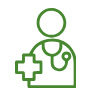Atarax Overview
Description
Atarax is a special medical tranquilizer. It is used for the treatment of anxiety in adults, symptomatic treatment of allergic itching, and sedation.
Contraindications
Contraindications for using Atarax include porphyria, pregnancy and childbirth, lactation, and use in children under 3 years of age. It is also contraindicated in individuals with hypersensitivity to any of the components of the drug, such as aminophylline, ethylenediamine, cetirizine, and other piperazine derivatives.
Administration
Atarax should be taken orally. Recommended doses for children depend on age and the type of treatment.
Possible Side Effects
On the part of the nervous system:
• Infrequently - dizziness, tremor, insomnia;
• Rarely - dyskinesia, convulsions;
On the part of the psyche:
• Infrequently - confusion, agitation;
• Rarely - disorientation, hallucinations;
On the part of the immune system:
• Rarely - hypersensitivity reactions;
• Very rarely - anaphylactic shock;
On the part of the cardiovascular system:
• Rarely - lower blood pressure, tachycardia;
On the part of the liver and biliary tract:
• Rarely - a violation of the liver function tests;
Additional side effects observed in patients treated with cetirizine (the main metabolite of hydroxyzine) include weight gain, enuresis, dysuria, oculogyric crisis, dystonia, asthenia, depression, aggression, paresthesia, tic, thrombocytopenia, oedema, and diarrhoea.
Dosage for Children
The doctor calculates the dose of Atarax for children individually, taking into account body weight and in accordance with the recommendations on dosage. The minimum dose is 12.5 mg.






